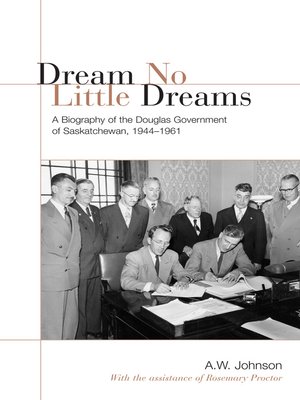Dream No Little Dreams
ebook ∣ A Biography of the Douglas Government of Saskatchewan, 1944-1961 · IPAC Series in Public Management and Governance
By A.W. Johnson

Sign up to save your library
With an OverDrive account, you can save your favorite libraries for at-a-glance information about availability. Find out more about OverDrive accounts.
Find this title in Libby, the library reading app by OverDrive.



Search for a digital library with this title
Title found at these libraries:
| Library Name | Distance |
|---|---|
| Loading... |
In 1944, the people of Saskatchewan elected the first socialist government in North America. Dream No Little Dreams is the biography of that government, led by the great Tommy Douglas of the Cooperative Commonwealth Federation (CCF, later the New Democratic Party). It is a history of the life of the CCF and a case study in the art and practice of governing; partly a study in the policy decisions of the government, and partly an insider's view. A.W. Johnson – a senior public servant in Saskatchewan during most of the Douglas years – begins by introducing the government's central mission – the transformation of the role of the state – and describes how it achieved this goal over some seventeen years.
Johnson analyses the roots of the CCF in Saskatchewan history and prairie politics, and its philosophy as it prepared to govern. He describes the policies and programs introduced by the Douglas government, the changes to the machinery of government and the processes of governing, and the creation of a professional public service.
Medicare is viewed by many as the greatest achievement of the Douglas government. Dream No Little Dreams offers rich insight into the initial planning stages of Medicare and details the protracted struggle with the medical profession that followed as Douglas fought to implement it. Johnson also addresses the question of how socialists were going to pay for all their ambitions, and situates the answer in the context of developments in national policy and in federal-provincial fiscal arrangements from the war years through to the 1960s.







